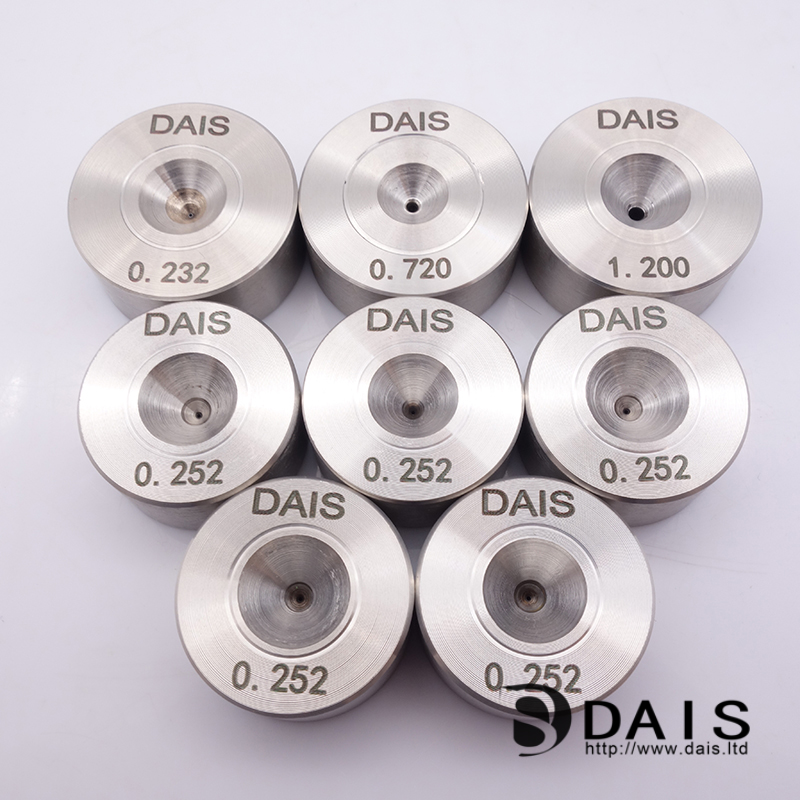Search

ADD:Building 123, Phase 3, Enterprise Base, No. 1 Lianhua Street, High-tech Industrial Development Zone, Zhengzhou, Henan, China
MOB.: +86-15517518512
MOB.: +86-15515520695
E-MAIL: admin@dais.ltd

Recently, China has become a major country in the world for wire products. A mold widely used by rrl in the wire industry is a wire drawing die. The inner hole of the drawing die is composed of a cylindrical surface and a cone. The conical surface is the compression zone for the wire (workpiece), and the cylinder is the sizing zone (polishing zone) of the drawing die. The diameter Lj corresponds to the size of the wire. The quality of wire drawing directly affects the shape, ruler, J, surface roughness and service life of the wire. The wire drawing die grinding process used in our country is the needle grinding process introduced from the Soviet Union in the early 1950s. The IJ reliability of this process is not high, and the production efficiency is low.
The reverse innovative design of wire drawing die polishing machine is developed to improve the service life of the wire drawing die, the polishing precision of the inner hole of the wire drawing die, and the polishing efficiency. The design of this subject will be a new type of wire drawing die line grinding and polishing machine, which is mainly composed of two parts: the clamp rotating mechanism and the wire frame reciprocating mechanism. The feature of this machine is that it can grind and polish the inner hole of the drawing die at one time, which greatly improves the production efficiency. The reciprocating motion mechanism of the wire frame adopts counterweight balance, so that the wire frame runs smoothly at high and low speeds, the processing range is widened, and the accuracy is improved, making the processing of small-diameter wire drawing dies a reality. The reverse innovation design of the wire drawing die polishing machine mainly has two aspects: one is the design of the polishing wire reciprocating motion system, and the other is the design of the fixture placement mechanism.
The source and research of the subject
Recently, China has become a global wire rod product power. But from the perspective of economic benefits, the gap is huge. All kinds of crystal production in the whole industry basically survive in the cracks of Shangbuyou companies, and have been on the verge of meager profits and losses for a long time. These must arouse great attention from the umbrella industry. my country's wire products industry is generally facing cost pressures. The fundamental way out is to strengthen technological progress and technological innovation, increase the proportion of high value-added products, and further strengthen corporate management, save resources, and improve competitiveness.
It is estimated that in 2010, the domestic consumption of medium and high-carbon wire products will increase to 8.65 million tons (excluding net exports). During the "Eleventh Five-Year Plan" period, my country's consumption of medium and high-carbon wire rod products will continue to grow, but the growth rate will drop somewhat. Because the manufacturing cost of medium and high-carbon wire (hard wire) is gradually narrowing the cost gap of ordinary low-carbon steel wire, which provides conditions for the further development of the production of high-carbon wire products. In addition, with the reduction of the production cost of high-carbon wire products, especially the price of high-quality high-strength steel wires and products used in the construction industry, the gap between ordinary low-carbon steel wires has gradually narrowed, creating conditions for the promotion of medium and high-carbon wire crystals in the construction industry. This will drive the continuous growth of the total consumption of high-carbon products. The continuous development of the wire industry puts forward more and more requirements on the drawing dies. Low cost and high quality require longer service life of the drawing dies and higher inner hole accuracy. In short, the quality of the drawing dies must be improved.
The inner hole of the wire drawing die is composed of a cylindrical conical surface. The cone is the compression zone for the wire (work). The cylindrical surface is the sizing area (polishing area) of the wire drawing die. The diameter L corresponds to the wire ruler and J. The quality of the drawing die directly dialects the shape, size, surface roughness and service life of the material wire. The wire-drawing die hole grinding process used in our country a few days ago is the needle grinding process introduced from the Soviet Union in the early 1950s. Its working principle is that the mold rotates and the needle-shaped grinding head moves or swings slightly in the grinding hole to achieve the daily processing of the mold hole. The reliability of this process is not high, and the production efficiency is low. The needle-shaped grinding head is designed to be tapered to make it easy to penetrate into the mold, and at the same time, the radial force component is generated during the grinding process to improve the grinding effect. But it also brings many drawbacks. First of all, the taper of the needle grinding head makes the die hole of the processed rice also have a taper. When the taper die hole is used for drawing, only the small end of the taper die hole plays a role in sizing. The sizing area is small, so the contact area during polishing operation is small. Then due to the existence of periodic contact load or alternating stress on the micro-volume acting on the friction surface during the working process of the wire drawing die, it is easy to make the surface or subsurface And cracks are formed. As a result, the mold hole L is severely worn, and the wire polishing quality is poor. Secondly, the needle-shaped grinding head is manufactured by work repair, and the shape of the grinding head is extremely difficult to present an ideal conical shape. Therefore, in the grinding process, because the needle grinding head is tapered, the radial component force exists, and it is almost impossible to completely balance it. The resulting eccentric force makes the suspended grinding head appear
now bends, thereby processing an eccentric die hole L. On the other hand, due to the irregularity of the die, high-frequency alternating stress occurs during the grinding process, resulting in vibration. For a "cantilever beam" structure, the vibration that exists during processing will affect the life of the entire structure.